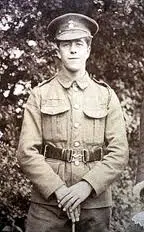
Michael Foreman’s children’s novel.
It’s one of the most endearing stories of World War I: the short Christmas truce in 1914, a pause in the fighting where British and German soldiers are said to have left their trenches spontaneously on Christmas day, smoked some cigarettes together in the no-man’s land, suddenly produced a ball and engaged in an unorganised football match, with over 30 on each side and no one keeping score. The story has been turned into a very nice animated short film named ‘War Games’ (Dave Unwin, 2001, 29 min., based on the 1989 children’s novel by Michael Foreman) and it played a key role in the 2005 major French movie ‘Joyeux Noël’ by Christian Carion (see trailer here).
It’s a great story, with decent ordinary people disregarding, if only for a short moment, the order from above to kill each other. According to some reports, spontaneous truces like this were observed at various points in Flanders and Northern France.
Unfortunately, despite the numerous photos taken on the front in these days, no one seems to have bothered to take one of any of these matches, and there are serious doubts about the veracity of this football fraternisation. Are we to believe the reports in several British newspapers dated January 1915, or are they actually some kind of propaganda with the aim to distinguish between ‘good’ Germans (Saxons, Swabians and Bavarians) and ‘evil’ Prussians? Was the story actually eagerly picked up, embellished and spread by post-war pacifists who, understandably, saw it as a good illustration of the absurdity of it all? Or cultivated by promotors of football with the objective to praise the game’s capacity to bring people together?

Bertie Feldstead (1894-2001).
According historian Paul Dietschy, serious historical research can only confirm these doubts. Most of the available witness reports are from someone who simply ‘watched’ one of these matches or ‘heard from someone else’ about them. On the other hand, over the last years, several of the former World War soldiers who were still alive at the beginning of the 21st century, confirmed the improvisation of such rather chaotic matches. One of them, Bertie Felstead, who died in 2001 aged 106, explicitly recalled that ‘it wasn’t a game as such, more a kick-around and a free-for-all; there could have been 50 on each side, for all I know’. According to him, it probably did not last much more than half an hour.
Paul concedes that if such a Christmas match took place, it certainly was in 1914, when the no-man’s land, despite the pieces of barbed wire and unexploded ammunition that were already lying around, was not yet as much turned upside down as in the following months and years. The trenches had only been dug some weeks before Christmas, and it is also certain that in many British batallions footballs were available. For the Germans, this is less likely, as the game was then still a rather bourgeois practice and, as historian Christiane Eisenberg points out, a sport that was not very equally spread in both social and geographic terms. On the other hand, as the gravestones in the Flanders cemeteries still show, many of the first volunteers who were on the front in late 1914 were students, enthusiastic members of the sporting and gymnastics movements and as such no doubt familiar with football by then. Engaging in a spontaneous fraternisation match with the ‘Tommies’ would also have fit well with the state of mind of many of these young men whose nationalist brainwash and belligerence quickly gave way to bitter disillusion. Paul Bäumer, the fictional hero in Erich Maria Remarque’s still impressive classic ‘All Quiet on the Western Front’ is a good example.
But that still does not tell us whether they did actually play or not. It seems that there is no final answer to this question. We can opt for a prudent ‘probably yes’, if we imagine such a spontaneous kick-around like kids improvising on the schoolyard during break. Because if the football truces did happen, that’s what they were: just a short break, a brief reminder of what life and leisure were like before the war.
Sources:
Iain Adams and Trevor Petney, ‘Germany 3 –Scotland 2, 25th December, 1914: Fact or Fiction’, in Jonathan Magee, Alan Bairner & Alan Tomlinson (ed.), The Bountiful Game? Football Identities and Finance, Oxford, Meyer & Meyer Sport, 2005, p. 21-41.
Christiane Eisenberg, ‘English Sports’ und deutsche Bürger. Eine Gesellschaftsgeschichte 1800-1939, Paderborn, Schöningh, 1999.
Stanley Weintraub, Silent Night. The Remarkable Christmas Truce of 1914, London, Simon & Schuster, 2001.
Thomas Löwer, ‘The various impacts of a short peace on the minds of soldiers. Demystifying the Christmas Truce’, online under http://www.greatwar.nl/frames/default-christmastruce.html
[cite]




